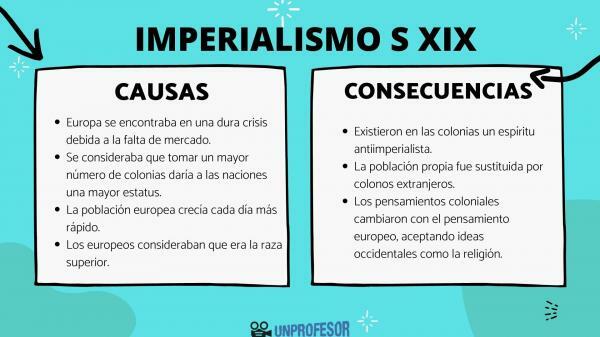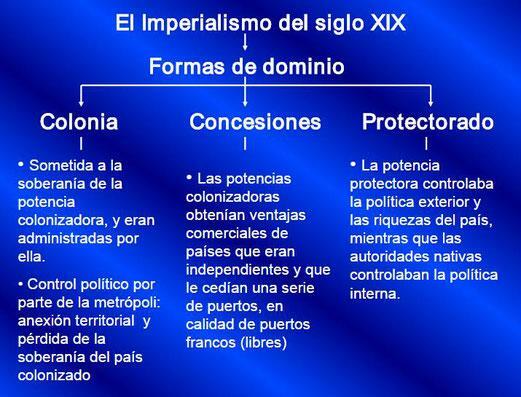IMPERIALISM of the XIX century: causes and consequences

For centuries we Europeans have depended on colonialism to maintain our economy, emerging systems such as the imperialism It was based on taking positions with their resources and manpower to be able to improve the economy. To see how this important process worked, in this lesson from a Teacher we are going to talk about the causes and consequences of 19th century imperialism.
European imperialism in the 19th century was a process that was characterized by development of capitalism through the conquest of African, Asian and Pacific island areas by the great European powers.
19th century imperialism took place between the years 1875 and 1914, being led by Great Britain, France and Germany like the great European powers of the moment, but also other regions with less power that were immersed in a late industrial revolution, being the cases of Italy, Belgium and Russia.
The great European powers face each other to be the nation with the largest number of colonies, since the more territories they had, the more power, wealth and influence they would have. All these powers defended their conquering stance with racism, including ideas that Western European culture was superior and therefore had the right to take over the African country.
Characteristics of European imperialism in the 19th century
To understand what imperialism was based on, we must talk about its main characteristics, in order to understand how important it was and everything that it affected. The main characteristics of imperialism are as follows:
- Formation of great colonial empires due to the enormous number of colonies that were taken by the European powers.
- Europe divided Africa as if it were a cake, even forming a Conference so that the nations could decide which African country each would stay.
- Four types of administration were established, these being the colonies, the protectorates, the concessions and the joint States.
- Division of labor between colonies and metropolises, since the former took the resources of their countries and the metropolises turned them into products that could be sold.
- Migration between continents increased, as the new colonies needed Europeans to rule.
- Creation of the assembly line to improve production.
- Creations of international companies that sought to control the trade of a certain product throughout the world.

Image: Socialerx
A process as important as imperialism does not happen overnight, but is the result of a series of causes that end up causing this important historical process. The main causes of imperialism are as follows:
- Economical: Europe was in a hard crisis due to the lack of a market, fearing that the capitalist system had failed, and therefore the Europeans They needed new markets to sell and at the same time a greater number of raw materials, the colonies being useful for this.
- Policies: It was considered that taking a greater number of colonies would give nations a higher status, as a kind of figure of power and influence if one empire was greater than another. A balance was also sought, uniting European countries in their search for colonialism was intended to stop them from attacking each other.
- Demographic: The European population grew faster every day and the resources that were obtained were increasingly scarce, so that European countries needed to use certain colonies as a kind of orchards of their own countries, serving to feed the population.
- Ideological: Europeans considered it to be the superior race, So in their thinking of natural selection and that the strongest survive, they had rights against weaker countries, all this serving as an excuse to conquer countries.
To end this lesson on the causes and consequences of 19th century imperialism, we must talk about the main changes that imperialism brought to the world, changing many countries forever and sowing seeds that in a few years they would explode. The main consequences of imperialism are as follows:
- Policies: There existed in the colonies a anti-imperialist spirit of citizens who did not agree that a nation had taken their country, after the World War II this spirit brought the independence process in many African regions and asian
- Economical: Were created huge infrastructures in the colonies to improve the industry, causing great changes in the landscape and ecosystem, after the departure of the metropolises these infrastructures could not be maintained. The crops of the countries changed, substituting their own products for others that they needed in the metropolis.
- Demographic: Own population was replaced by foreign settlers, Due to the fact that a large part of the population of the colonies died from the wars of conquest, external diseases, lack of food and from hard working hours.
- Ecological: The ecosystems of the colonies were destroyed to exploit crops and introduce European species, even destroying entire forests.
- Ideological: Colonial thoughts changed due to the entry of European thought, accepting Western ideas such as the religion or different types of government. The influence in later years of fascism is considered to be a consequence of imperialism, because they share the thinking of the superior race.



